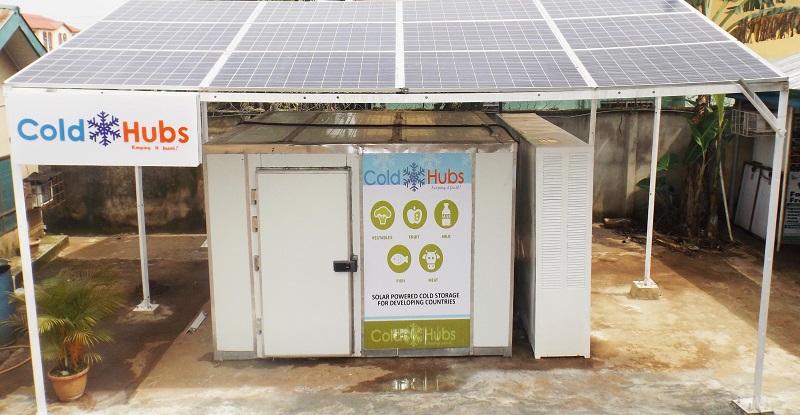Nigerian startup ColdHubs is helping farmers and market vendors become more profitable by eliminating food waste via 100 per cent solar-powered walk-in cold rooms.
Founded in July 2015 by young farmer and social entrepreneur Nnaemeka Ikegwuonu, ColdHubs is producing cold rooms and selling them to smallholder farmers, retailers and wholesalers to store and preserve fresh fruits, vegetables and other perishable foods, extending their shelf life from two days to 21.
The startup has had a good 2018 so far, winning funding from the MIT Solve initiative and the Microsoft Airband Grant Fund, yet its concept is relatively simple. Its “ColdHubs” are made of 120mm thick insulating cold room panels to retain cold, with energy provided by solar panels mounted on the roof.
The energy efficient monoblock refrigeration unit is connected to an inverter that enables the solar-powered batteries to supply energy for night cooling. Each ColdHub can fit approximately three tonnes of perishable food, arranged in at least 150 units of 20kg plastic crates stacked on the floor.
“Each ColdHub is guaranteed to provide autonomous refrigeration 24 hours a day without grid connection. The cooling temperature is adjustable from five to 15 degrees celsius, and the cold room’s unique safety door efficiently keeps cold air inside,” Ikegwuonu told Disrupt Africa.
Prior to ColdHubs, farms and markets lacked cold storage solutions, meaning sellable food was often wasted. The solution has been eagerly accepted by farmers and merchants, with the five ColdHubs currently in use having reached 100 per cent capacity utilisation in August of last year.
“We have six more ColdHubs coming online before the end of the year and up to 20 more next year. We are operating in Nigeria and plan expansion across the country, and into East and Southern Africa,” Ikegwuonu said.
ColdHubs operates a simple pay-as-you-store model, with farmers and retailers paying NGN100 (US$0.50) to store one crate for one day. Each hub is operated by a manager, who monitors the loading and unloading of crates, collects the fees, and builds relationships in farm clusters and markets.
The startup has been funded by a combination of equity and debt investments, and grant funding.


